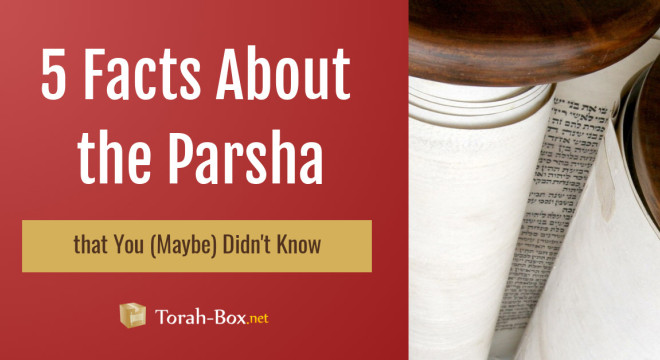
Behar
5 Facts About Parshat Behar that you (maybe) didn't know
Discover and learn every week, "5 Facts" written on the weekly Parshah that you can share at your Shabbos table.
וַיְדַבֵּ֤ר יְהוָה֙ אֶל־מֹשֶׁ֔ה בְּהַ֥ר סִינַ֖י לֵאמֹֽר׃ (25:1)
The LORD spoke to Moses on Mount Sinai:
1. Were all Torah commandments given at once?
- The reason “Mt. Sinai” is mentioned in the discussion on the laws of Shemitta is to teach us that all the laws of the Torah, without exception, were given at Mt. Sinai. (Rashi)
וְ֠הָיְתָה שַׁבַּ֨ת הָאָ֤רֶץ לָכֶם֙ לְאָכְלָ֔ה לְךָ֖ וּלְעַבְדְּךָ֣ וְלַאֲמָתֶ֑ךָ וְלִשְׂכִֽירְךָ֙ וּלְתוֹשָׁ֣בְךָ֔ הַגָּרִ֖ים עִמָּֽךְ׃ (25:6)
But you may eat whatever the land during its sabbath will produce—you, your male and female slaves, the hired and bound laborers who live with you.
2. What are the consequences for someone who transgresses Shemitta laws?
- The Talmud learns from here that those who do commerce with the produce of the 7th year disqualified to serve as a witness. Eating the produce is permitted; doing commerce with it is forbidden. Therefore, one who does commerce with shemitta produce is considered to be a rasha. There are however, some situations in which selling shemitta produce is permitted, such as selling it in a casual, unprofessional manner, or selling it when one originally collected it for eating and there is too much left over. (Sanhedrin 25b, Tosefot in Avodah Zarah 62b, Tosefot in Rosh Hashana 22a)
וְהַֽעֲבַרְתָּ֞ שׁוֹפַ֤ר תְּרוּעָה֙ בַּחֹ֣דֶשׁ הַשְּׁבִעִ֔י בֶּעָשׂ֖וֹר לַחֹ֑דֶשׁ בְּיוֹם֙ הַכִּפֻּרִ֔ים תַּעֲבִ֥ירוּ שׁוֹפָ֖ר בְּכָל־אַרְצְכֶֽם׃ (25:9)
Then you shall sound the horn loud; in the seventh month, on the tenth day of the month, the Day of Atonement, you shall have the horn sounded throughout your land.
3. What kinds of Shofar blows were blown to announce the Yovel?
- From here the sages learn that the shofar blast that announces the Yovel year must resemble the manner in which the shofar is sounded on Rosh Hashana: a long blast, a broken blast, and again, a long blast. (Rosh Hashana 26b)
וְקִדַּשְׁתֶּ֗ם אֵ֣ת שְׁנַ֤ת הַחֲמִשִּׁים֙ שָׁנָ֔ה וּקְרָאתֶ֥ם דְּר֛וֹר בָּאָ֖רֶץ לְכָל־יֹשְׁבֶ֑יהָ יוֹבֵ֥ל הִוא֙ תִּהְיֶ֣ה לָכֶ֔ם וְשַׁבְתֶּ֗ם אִ֚ישׁ אֶל־אֲחֻזָּת֔וֹ וְאִ֥ישׁ אֶל־מִשְׁפַּחְתּ֖וֹ תָּשֻֽׁבוּ׃ (25:10)
And you shall hallow the fiftieth year. You shall proclaim release throughout the land for all its inhabitants. It shall be a jubilee for you: each of you shall return to his holding and each of you shall return to his family.
4. What are the consequences for someone who transgresses Shemitta laws?
- The root of the word Yovel means “ram”. Others say it comes from the word hovel/to transport, alluding to the fact that belongings are reverted and “transported” back to their original owners. (Rashi, Ibn Ezra, Ramban, Rabenu Bachya, Mincha Belulah)
אַל־תִּקַּ֤ח מֵֽאִתּוֹ֙ נֶ֣שֶׁךְ וְתַרְבִּ֔ית וְיָרֵ֖אתָ מֵֽאֱלֹהֶ֑יךָ וְחֵ֥י אָחִ֖יךָ עִמָּֽךְ׃ (25:36)
Do not exact from him advance or accrued interest, but fear your God. Let him live by your side as your kinsman.
5. How important is the Mitvzvah of not charging interest?
- The word “ribbit/interest” has a numerical value of 612, one short of 613 (the number of mitzvot in the Torah). This teaches us that the mitzvah of not charging ribbit is equivalent to all the other mitzvot combined. (Baal Haturim)
Torah-Box.net Account
To access the entire Torah-Box.net website, sign up for free in less than a minute.
Weekly Parsha
 Candle Lighting - New York
Candle Lighting - New York
Friday December 19th, 2025 at 16:13 *Shabbat ends at 17:17 *
change my location
* Times given as an indication, check the times of your community










